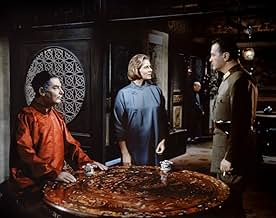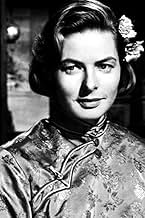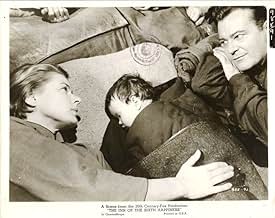IMDb RATING
7.2/10
5.6K
YOUR RATING
A tenacious British woman becomes a missionary and runs an inn for travelling merchants in China during the Japanese invasion and the tumultuous years leading up to the Second World War.A tenacious British woman becomes a missionary and runs an inn for travelling merchants in China during the Japanese invasion and the tumultuous years leading up to the Second World War.A tenacious British woman becomes a missionary and runs an inn for travelling merchants in China during the Japanese invasion and the tumultuous years leading up to the Second World War.
- Nominated for 1 Oscar
- 3 wins & 7 nominations total
Curd Jürgens
- Capt. Lin Nan
- (as Curt Jurgens)
Noel Hood
- Miss Thompson
- (as Noël Hood)
Chris Adcock
- Russian Soldier
- (uncredited)
Frank Blaine
- Madman
- (uncredited)
Alexis Bobrinskoy
- Russian Fireman
- (uncredited)
- Director
- Writers
- All cast & crew
- Production, box office & more at IMDbPro
Featured reviews
I speak as an Asian who understands that it is not always easy to play an Asian, even if you are an Asian. And when an English person stays amongst the Asians for some time, they very rarely speak English the way they're supposed to. And that would probably explain the second half of the movie where Ingrid doesn't speak with the same strong accent, great acting, I believe!
For the Asian watching such a movie, there was very little to complain about. However, the spoken Chinese by the Chinese assistant was not always correct - but only a Chinese would have noticed that, not a Westener nor any other non-Chinese Asian.
And then there were great scenes that were screened in Wales(?). How many would have realized that it wasn't filmed in China? Not many, I am sure.
Kudos to the producer and director of The Inn of the Sixth Happiness. It was a great effort.
One can only pray that Hollywood will be able to make movies like this again!
For the Asian watching such a movie, there was very little to complain about. However, the spoken Chinese by the Chinese assistant was not always correct - but only a Chinese would have noticed that, not a Westener nor any other non-Chinese Asian.
And then there were great scenes that were screened in Wales(?). How many would have realized that it wasn't filmed in China? Not many, I am sure.
Kudos to the producer and director of The Inn of the Sixth Happiness. It was a great effort.
One can only pray that Hollywood will be able to make movies like this again!
Once more, in this film as she had in her earlier films, Ingrid Bergman proves she was "A PERFECT ACTRESS!" In this film, "Inn of the Sixth Happiness," she plays Englishwoman Gladys Aylward who knew that China was the place where she belonged. Not qualified to be sent there as a missionary she worked and saved her money until she had enough to go on her own. Once there, she meets up with people who manage to help her through her first days. Then, she is nearly all alone and must make it or leave China. She stays. Eventually, just as WW2 is breaking out, she rescues over 100 children and takes them to freedom.
Again, I repeat, it clearly shows Ingrid Bergman as a perfect actress. She shows her talent and charm all through this film and it is one everyone in the family can watch and appreciate. I highly recommend it.
Again, I repeat, it clearly shows Ingrid Bergman as a perfect actress. She shows her talent and charm all through this film and it is one everyone in the family can watch and appreciate. I highly recommend it.
In the 30's, the working-class Englishwoman Gladys Aylward (Ingrid Bergman) leaves Liverpool and arrives in London, trying to join the China Missionary Society expecting to be sent to China. However, having only ordinary schooling, her request is turned down due to her lack of qualification to the position. Gladys works hard as a maid and uses all her savings and salaries to buy a train ticket to Tientsin. Then she travels by mule to the remote province of Wangcheng, where she works with the Englishwoman Jeannie Lawson (Athene Seyler) and the Chinese cook Yang (Peter Chong) in the Inn of the Sixth Happiness. When Ms. Lawson has an accident and dies, Gladys has no money to run the establishment and accepts the position of "foot inspector" offered by the Mandarin Hsien Chang (Robert Donat). She is assigned to visit the countryside to promote and enforce the government's law against foot binding Chinese girls. She is successful, changes her nationality to Chinese and her name to Jen-ai (meaning "the one who loves people"), surprising the skeptical bi-racial Captain Lin Nan (Curt Jurgens). When Wangcheng is invaded by the Japanese, Jen-ai travels through the mountains with one hundred children to save them from death.
"The Inn of the Sixth Happiness" is a wonderful and engaging epic based on the true story of the enlightened Gladys Aylward. Her biography romanticized by Hollywood is awesome, and the movie is fantastic. Ingrid Bergman is stunning in the role of a servant in a period of class struggle in London determined to go to China where she believes she belongs and has a mission from God to be accomplished. The colors and the landscapes are impressive, but the cast of Ingrid Bergman as a woman not gorgeous; Curt Jurgens as a Chinese-Caucasian; and Robert Donat as a Chinese is weird, but they have perfect performances and I believe that is what matters in a film. My vote is nine.
Title (Brazil): "A Morada da Sexta Felicidade" ("The Inn of the Sixth Happiness")
"The Inn of the Sixth Happiness" is a wonderful and engaging epic based on the true story of the enlightened Gladys Aylward. Her biography romanticized by Hollywood is awesome, and the movie is fantastic. Ingrid Bergman is stunning in the role of a servant in a period of class struggle in London determined to go to China where she believes she belongs and has a mission from God to be accomplished. The colors and the landscapes are impressive, but the cast of Ingrid Bergman as a woman not gorgeous; Curt Jurgens as a Chinese-Caucasian; and Robert Donat as a Chinese is weird, but they have perfect performances and I believe that is what matters in a film. My vote is nine.
Title (Brazil): "A Morada da Sexta Felicidade" ("The Inn of the Sixth Happiness")
In spite of the rejection of her application for missionary work because of her lack of formal education, Gladys Aylwarda strong London domestic in the service of a retired explorerdecides to join an English missionary who has set up a hostelry in the mountains of North China... Here, Sara Lanson (Athene Seyler) takes in muleteers, provides them with food and lodging, and tries by ingenious means to convert them to Christianity...
Gladys saves enough money to travel to China via the Trans-Siberian Railway... Eventually she reaches the inn and Miss Lanson, and becomes her aide...
Gradually, Gladys wins over the people of the area, with her good works and humble, friendly approach... Soon she is known as "Jan-Ai" (The One Who Loves People).
After Miss Lanson's death, Gladys goes to work as a foot inspector (to enforce a government edict against binding of females' foot) at the request of a tired and cynical mandarin (Robert Donat), who is irritated by her meddling and sends her on foot-inspection trips to get rid of her... But upon her return from an arduous journey, he finds himself respectful of her dedication and courage and becomes her friend...
Captain Lin Nan (Curt Jurgens), a Chinese Army officer, comes into the district to enforce discipline in the face of the Japanese 1931 invasion... Gladys meanwhile has succeeded in restoring order in a prison uprising with her healing presence, and when Lin Nan finds it necessary to warn the people of the countryside against the Japanese, Gladys, through bandits she has befriended and are now devoted to her, manages to aid him in his efforts...
Lin and Gladys gradually fall in love, and before he leaves to rejoin the Chinese forces, he gives her a jade ring as a token of his feeling, and promises that they will someday be permanently together...
The Japanese attack, and it becomes necessary to march 100 motherless children to a mission safe in the interior... Before Gladys volunteers for, and leaves on, the mission with the children, the Mandarin offers her a parting gift: his conversion to Christianity.
There is no doubt about the splendor of Ingrid Bergman dramatizing Gladys Aylward, the "woman who wasn't qualified to come to China." With a luminous smile, she fills the screen with radiance, bringing missionary work purity of spirit, challenge, simplicity, frankness, honesty, energy, force and love...
The film, based on the novel "The Small Woman" by Alan Burgess, is a fine adventure story with love, war, religion, comedy, music, and spectacle...
Hollywood took some liberties in romancing the character with a Chinese officerwhich was not trueGladys Aylward (1904-70) was a great 'little woman' who lived a virtuous life full of quality, respect and admiration... She faced the impossible with hope, seeing the world through God's telescope...
Gladys saves enough money to travel to China via the Trans-Siberian Railway... Eventually she reaches the inn and Miss Lanson, and becomes her aide...
Gradually, Gladys wins over the people of the area, with her good works and humble, friendly approach... Soon she is known as "Jan-Ai" (The One Who Loves People).
After Miss Lanson's death, Gladys goes to work as a foot inspector (to enforce a government edict against binding of females' foot) at the request of a tired and cynical mandarin (Robert Donat), who is irritated by her meddling and sends her on foot-inspection trips to get rid of her... But upon her return from an arduous journey, he finds himself respectful of her dedication and courage and becomes her friend...
Captain Lin Nan (Curt Jurgens), a Chinese Army officer, comes into the district to enforce discipline in the face of the Japanese 1931 invasion... Gladys meanwhile has succeeded in restoring order in a prison uprising with her healing presence, and when Lin Nan finds it necessary to warn the people of the countryside against the Japanese, Gladys, through bandits she has befriended and are now devoted to her, manages to aid him in his efforts...
Lin and Gladys gradually fall in love, and before he leaves to rejoin the Chinese forces, he gives her a jade ring as a token of his feeling, and promises that they will someday be permanently together...
The Japanese attack, and it becomes necessary to march 100 motherless children to a mission safe in the interior... Before Gladys volunteers for, and leaves on, the mission with the children, the Mandarin offers her a parting gift: his conversion to Christianity.
There is no doubt about the splendor of Ingrid Bergman dramatizing Gladys Aylward, the "woman who wasn't qualified to come to China." With a luminous smile, she fills the screen with radiance, bringing missionary work purity of spirit, challenge, simplicity, frankness, honesty, energy, force and love...
The film, based on the novel "The Small Woman" by Alan Burgess, is a fine adventure story with love, war, religion, comedy, music, and spectacle...
Hollywood took some liberties in romancing the character with a Chinese officerwhich was not trueGladys Aylward (1904-70) was a great 'little woman' who lived a virtuous life full of quality, respect and admiration... She faced the impossible with hope, seeing the world through God's telescope...
This film concerns the life and achievements of one Gladys Aylward, a Christian woman from Great Britain who conceived early on that her place in the world was in China. She was a remarkable person who let absolutely nothing deter her in her calling. That included a lack of formal education, no support at all from any accredited missionary group and no money of her own. She worked as a maid to get the money to get a one way ticket to China with only an address of an aged female missionary who needed a young assistant.
This film marked Ingrid Bergman's complete return to our fickle public's favor. After the scandal of her affair with Roberto Rosellini and her divorce, the public would not accept her in saintly roles like Joan of Arc and The Bells of St. Mary's. But winning her second Oscar two years earlier cemented her comeback from Europe and this part restored her in our fickle public's affections. We'd never get away with casting her as an Englishwoman today, but she overcomes any accent problems with unbridled talent.
She soon inherits the whole mission when Athene Sayler dies. And she supports it by working as a foot inspector for the local mandarin. In those days of the twenties among other things the Kuomintang government was trying to do was undo the Chinese custom of footbinding females at a young age so they would have petite feet. It met with a lot of local resistance, but she proves up to the task.
The title of the film comes from the idea that Athene Sayler had. Not to open up a formal church as such. Instead she wanted to open an inn in which travelers could stop and hear stories for entertainment. No television in those rooms. The stories they heard were those of the Bible. It was Sayler, Bergman, and their cook Peter Chong who ran the place and soon it was Bergman and Chong.
If Bergman's casting seems bizarre by today's standards, the casting of Curt Jurgens as a Chinese Kuomintang Army Colonel is worse. Jurgens's occidental features are written into the script making him bi-racial, Dutch father and Chinese mother. He's a man with little convictions about spiritual matters, except he comes to believe in Bergman, in her innate decency, her dedication to his people, and what she's trying to accomplish.
The mandarin is even more bizarrely cast. The part calls for an asthetic actor so they got the best around in Robert Donat. This was Mr. Donat's farewell performance, he died while the film was still in theaters. No one would get away with that casting today, but Robert Donat is also that good a player.
I'm sure if the film were remade today, we'd have real oriental players like Russell Wong for the Colonel and James Shigeta for the mandarin and maybe someone like Kate Winslet for Gladys Aylward. But would it be as good as this film?
The subject of missionaries and the good they do is one hotly debated topic. It does take a certain amount of brass to go to a given place and tell everyone your belief system is all wrong.
I suppose the best way to lead is by example and Ingrid Bergman as Gladys Aylward set the best example she could. In fact she did one thing most missionaries, good or bad, wouldn't consider. She gave up her British citizenship and became a Chinese citizen.
The film was helped a great deal by the inclusion of that children's song This Old Man where Ingrid tries to teach her youngest charges some English with it. It was enormously popular back in the day and Mitch Miller's record of it was heard constantly.
The climax of the film and what gave Gladys Aylward her place in history is that trek with a hundred orphans away from the advancing Japanese army. A remarkable achievement indeed from a remarkable dedicated woman who wouldn't listen to anything, but what was inside her soul.
This film marked Ingrid Bergman's complete return to our fickle public's favor. After the scandal of her affair with Roberto Rosellini and her divorce, the public would not accept her in saintly roles like Joan of Arc and The Bells of St. Mary's. But winning her second Oscar two years earlier cemented her comeback from Europe and this part restored her in our fickle public's affections. We'd never get away with casting her as an Englishwoman today, but she overcomes any accent problems with unbridled talent.
She soon inherits the whole mission when Athene Sayler dies. And she supports it by working as a foot inspector for the local mandarin. In those days of the twenties among other things the Kuomintang government was trying to do was undo the Chinese custom of footbinding females at a young age so they would have petite feet. It met with a lot of local resistance, but she proves up to the task.
The title of the film comes from the idea that Athene Sayler had. Not to open up a formal church as such. Instead she wanted to open an inn in which travelers could stop and hear stories for entertainment. No television in those rooms. The stories they heard were those of the Bible. It was Sayler, Bergman, and their cook Peter Chong who ran the place and soon it was Bergman and Chong.
If Bergman's casting seems bizarre by today's standards, the casting of Curt Jurgens as a Chinese Kuomintang Army Colonel is worse. Jurgens's occidental features are written into the script making him bi-racial, Dutch father and Chinese mother. He's a man with little convictions about spiritual matters, except he comes to believe in Bergman, in her innate decency, her dedication to his people, and what she's trying to accomplish.
The mandarin is even more bizarrely cast. The part calls for an asthetic actor so they got the best around in Robert Donat. This was Mr. Donat's farewell performance, he died while the film was still in theaters. No one would get away with that casting today, but Robert Donat is also that good a player.
I'm sure if the film were remade today, we'd have real oriental players like Russell Wong for the Colonel and James Shigeta for the mandarin and maybe someone like Kate Winslet for Gladys Aylward. But would it be as good as this film?
The subject of missionaries and the good they do is one hotly debated topic. It does take a certain amount of brass to go to a given place and tell everyone your belief system is all wrong.
I suppose the best way to lead is by example and Ingrid Bergman as Gladys Aylward set the best example she could. In fact she did one thing most missionaries, good or bad, wouldn't consider. She gave up her British citizenship and became a Chinese citizen.
The film was helped a great deal by the inclusion of that children's song This Old Man where Ingrid tries to teach her youngest charges some English with it. It was enormously popular back in the day and Mitch Miller's record of it was heard constantly.
The climax of the film and what gave Gladys Aylward her place in history is that trek with a hundred orphans away from the advancing Japanese army. A remarkable achievement indeed from a remarkable dedicated woman who wouldn't listen to anything, but what was inside her soul.
Did you know
- TriviaThis is the final film of Robert Donat, who died during its making. In the scene in which he is saying goodbye to Gladys as the elders prepare to take their leave of the city, he says, as though he was prophesying his death, "I fear we shall never see each other again."
- GoofsThe captain is talking with Gladys and says that someone will listen to anything for an extra bowl of rice. The story takes place in northern China and rice is only eaten in southern China. Noodles made from wheat was the mainstay of the Chinese diet in the north. Later in the film it appears Gladys takes a serving of rice from a large pot, and lastly on the journey with the children they come across some uncooked rice which Gladys picks it up.
- Quotes
[Robert Donat's final line in his final film]
The Mandarin: We shall not see each other again, I think. Farewell, Jen-Ai.
- Crazy creditsThe opening title card reads: "This story is based upon the life of Gladys Aylward, a woman of our time, who was, and is dedicated to the simple, joyful and rare belief that we are all responsible for each other."
- ConnectionsFeatured in Ingrid (1984)
- SoundtracksTHE CHILDREN'S MARCHING SONG (THIS OLD MAN)
Traditional (Arranged by Malcolm Arnold)
Sung by Ingrid Bergman and a children's chorus
- How long is The Inn of the Sixth Happiness?Powered by Alexa
Details
- Release date
- Countries of origin
- Languages
- Also known as
- The Inn of the Sixth Happiness
- Filming locations
- Production company
- See more company credits at IMDbPro
- Runtime2 hours 38 minutes
- Color
- Aspect ratio
- 2.35 : 1
Contribute to this page
Suggest an edit or add missing content

Top Gap
By what name was L'auberge du sixième bonheur (1958) officially released in India in English?
Answer





























